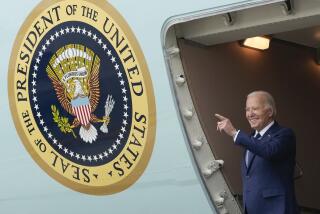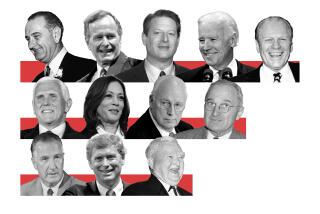POLITICS ’88 : Many Were Called, One Was Chosen : Quick Consensus Follows Weeks of Work
- Share via
BOSTON — In the end, after the weeks of meetings and the scores of lawyers reviewing thousands of pages of documents, the decision came quickly.
Michael S. Dukakis had met with his leading advisers throughout the day Monday while his chief aide, Paul P. Brountas, traveled to Washington for a final interview with the one man who publicly had sought the No. 2 slot on the Dukakis ticket, the Rev. Jesse Jackson.
By the time Brountas--delayed in Washington by summer thunderstorms--managed to return to Boston for a final meeting Monday night, the hour was late and a consensus already had begun to form leading toward the eventual choice: Texas Sen. Lloyd Bentsen.
Candidate Mows the Lawn
As Dukakis waited for his longtime friend to return, he nonchalantly mowed his lawn, pushing the hand mower through the grass in the sultry evening air. Then, around 10:30 p.m., they gather1701060719at the Dukakis home in suburban Brookline: Dukakis, his wife, Kitty, Brountas, campaign manager Susan Estrich and her deputy, Jack Corrigan.
The list of candidates was familiar to them. “We did not consider political factors” at the meeting, Brountas recalled, but they did not have to. This small group had worked together so long that each already knew the others’ views on the political pluses and minuses of the men under consideration.
As they reviewed potential nominees, Dukakis and his staff found no perfect candidates.
There was Jackson, a fatal political liability in the eyes of Dukakis’ advisers. Jackson received the same scrutiny given each of the other candidates. But the campaign’s unwillingness to take him on as a running mate was made clear by the timing of the initial meetings Monday. Dukakis had met with his advisers in the morning to review the list even before Brountas met with Jackson to go over his qualifications one last time.
Some Support for Glenn
Among the others on the list, Sen. John Glenn of Ohio had considerable support in Washington but was seen by many on the staff as a weak candidate who had done poorly in his own 1984 presidential bid. He had ended that campaign $2.4 million in debt and the Federal Election Commission had taken him to court over the legality of the loans he took out to finance his drive.
Rep. Lee H. Hamilton of Indiana, although a personal favorite of Dukakis’ and a well-regarded expert on foreign policy, had no experience campaigning nationally and little likelihood of carrying his own state.
Those two were believed to have been the closest of the also-rans. Among the others, Rep. Richard A. Gephardt of Missouri and Tennessee Sen. Albert Gore Jr. had competed in the primaries but had done less well than Jackson. Picking either of them would have been harder to explain to Jackson supporters than the choice of Bentsen.
Sen. Bob Graham of Florida offered only two years of Washington experience and hailed from a state that would be even harder for a Democrat to win than Texas.
Potentially Winnable State
Bentsen, by contrast, offers a potentially winnable electoral prize. He had drawn neither public support nor opposition from Jackson and his followers, so picking him would not be seen either as a provocation or a concession. And Dukakis, who over and over again has compared his campaign to that of his youthful hero, John F. Kennedy, seemed captivated by the idea Tuesday of resurrecting the “Boston-Austin axis” that had put Kennedy and Lyndon B. Johnson in the White House in 1960.
Difficult Questionnaire
Each of the seven had been asked to answer what Brountas called a “comprehensive and difficult” questionnaire designed to ferret out the sorts of personal or financial problems that had plagued vice presidential nominees in the past.
Each had been interviewed twice by Brountas, who had also spoken with each man’s wife and about 200 other elected officials, party activists and supporters from around the country.
Jackson was the last to submit the requested information. But in the end, Brountas said, “no one was ruled out” because of problems uncovered in the screening.
After that extensive review, the final meeting took only an hour. By the end, at 11:30, as they went around the table one last time, Bentsen was the consensus pick.
More to Read
Get the L.A. Times Politics newsletter
Deeply reported insights into legislation, politics and policy from Sacramento, Washington and beyond. In your inbox twice per week.
You may occasionally receive promotional content from the Los Angeles Times.









